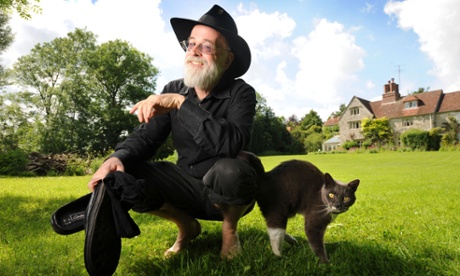
Like many people on Twitter, I felt the red mist descend as I read Guardian art columnist Jonathan Jones’s newly published article saying that life is too short to read a Terry Pratchett novel. I’ve loved the Discworld books since I was nine and also spent some of my professional life carefully reading and commenting on them. But a raised eyebrow and a shoulder shrug are probably the most dignified response to Jones’s declaration that while he doesn’t intend to read a single one of Pratchett’s books, he is nonetheless sure that they’re not “actual literature” and that the late author was a “mediocrity” churning out “ordinary potboilers”.
When he turned his attention to “the true delights of ambitious fiction”, though, I had to speak up. Jones writes:
“This summer I finally finished Mansfield Park. How had I managed not to read it up to now? It’s shameful. But at least now it’s part of my life. The structure of Jane Austen’s morally sombre plot, the restrained irony of her style, the sudden opening up of the book as it moves from Mansfield Park to Portsmouth and takes in the complex real social world of regency England – all that’s in me now. Great books become part of your experience. They enrich the very fabric of reality.”
Funnily enough, I finally finished Equal Rites by Terry Pratchett this summer. And I too can’t believe that I haven’t read it before. In fact – and I hope you’ll forgive my irony for its lack of restraint – I could write almost the exact same paragraph about this Discworld novel.
Here we go:
“This summer I finally finished Equal Rites. How had I managed not to read it up to now? It’s shameful. But at least now it’s part of my life. The structure of Terry Pratchett’s’s morally sombre plot, the restrained irony of his style, the sudden opening up of the book as it moves from the tiny village of Bad Ass to Ankh Morpok and takes in the complex unreal social world of the pre-Vetinari Discworld – all that’s in me now. Great books become part of your experience. They enrich the very fabric of reality.”
Because there’s certainly a moral weight to Pratchett’s story. There’s sharpness and seriousness alongside the jokes. The heroine Eskarina Smith’s move from her isolated country village to the complex social world of a richly layered city and university community explores serious issues – not least because this is an arena dominated by men and Pratchett so eloquently makes the case (often with delightful and even restrained irony) for her place within it. It’s definitely done good things to the fabric of my reality - and given me some damn fine unreality to ponder too.
In short, this book fulfills all Jones’s criteria. In fact, it has a lot in common with Jane Austen’s work. It’s funny. It poses serious moral questions. It has a tight-winding plot. It features moments of beautiful prose that, like Austen’s, rely on exquisite timing and rhythm:
“The entire universe has been neatly divided into things to (a) mate with, (b) eat, (c) run away from, and (d) rocks.”
“They may have been ugly. They may have been evil. But when it came to poetry in motion, the Things had all the grace and coordination of a deck-chair.”
So even though he’s sworn off Pratchett, I’d be very tempted to recommend Equal Rites to Jonathan Jones – except that the truth is, this early novel is probably lesser Pratchett. It’s got a few rough edges. Pratchett hadn’t quite got the grip on his own silliness that he would have in later novels. It’s always delightful, but here it can be a distraction rather than a vital and astonishing part of the action.
But no fear. There are dozens of other Discworld books to choose from and many of them display “the talent of an angel” that Jones found in Bukowski, another author he read this summer. Night Watch, for instance, can hold its own with the best of the Victorians and it beats the hell out of Bukowski. It has profound moral complexity, hard emotional impact, careful plotting, gritty political insight and, best of all, raw, urgent humanity. It is serious reading. It is ambitious fiction. It is not mediocrity. It is not an ordinary potboiler.
I’ll leave it to posterity to decide whether or not it’s genius; but it’s an important book – and just one of many by an important writer. There’s no shame in celebrating that.

